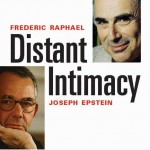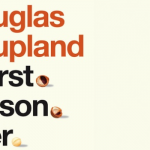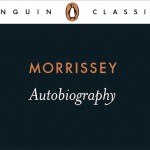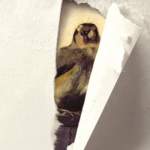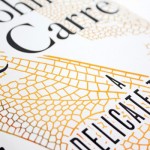Hatchet Job 2014 | Previous years | Manifesto | Press
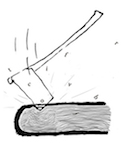
Zoë Heller on Joseph Anton by Salman Rushdie
THE NEW YORK REVIEW OF BOOKS
WHEN ANIS Rushdie read his son’s novel Midnight’s Children for the first time in 1980, he became convinced that Ahmed Sinai, the drunken father in the book, was a satirical portrait of himself. A family row ensued. Rushdie fils did not deny that Sinai was based on his father—“In my young, pissed-off way,” he would later tellThe Paris Review, “I responded that I’d left all the nasty stuff out”—but he objected to his father’s wounded reaction and thought it revealed a crude understanding of how novels worked. “My father had studied literature at Cambridge so I expected him to have a sophisticated response to the book, but the person who did was my mother…. She understood it at once as fiction.”
The position that Rushdie took during this literary-domestic spat uncannily prefigured the position he would take nine years later, when confronted by the wrath of another, more punishing patriarch. On February 15, 1989, a day after the Ayatollah Khomeini had issued a fatwa condemning him to death for his authorship of The Satanic Verses, Rushdie appeared on British television and announced that he wished his book had been “more critical” of Islam. As he reports in Joseph Anton—a memoir he has chosen to write in a de Gaulle–like third person—his principal emotion at the time was one of bafflement:
When he was first accused of being offensive, he was genuinely perplexed. He thought he had made an artistic engagement with the phenomenon of revelation; an engagement from the point of view of an unbeliever, certainly, but a proper one nonetheless. How could that be thought offensive? The thin-skinned years of rage- defined identity politics that followed taught him, and everyone else, the answer to that question.
Given how often Rushdie has been accused of writing The Satanic Verses with the express purpose of making trouble, it is understandable that he should wish to highlight the unexpected—the unprecedented—nature of the events that followed the novel’s publication. Even so, his retrospective account of himself as a bookish innocent, bewildered by the world’s coarse intrusion into the literary sphere, seems a little over-egged. By this point in his career, Rushdie, who had already been sued by Indira Gandhi for libelous statements in Midnight’s Children and had already seen his third novel banned in Pakistan, was better qualified than most to appreciate literature’s capacity for eliciting hostile, nonliterary responses.
More troubling, however, than his exaggerated claim to naiveté is the case that Rushdie seems to be making for fiction’s immunity from political or religious anger. In a departure from the standard, liberal notion that literature must be free to offend, he proposes that literature, properly understood, cannot offend. Muslims who were insulted by The Satanic Verses were guilty of a category error: just like Anis Rushdie, in his “unsophisticated” reading of Midnight’s Children, they had confused fiction with other sorts of speech:
Anyway, his Prophet was not called Muhammad, lived in a city not called Mecca, and created a religion not (or not quite) called Islam. And he appeared only in the dream sequences of a man being driven insane by his loss of faith. These many distancing devices were, in their creator’s opinion, indicators of the fictive nature of his project.
One of the great sorrows of the fatwa years for Rushdie—more personally agitating to him, he has claimed, than the assault on his freedom of speech, or even the threat to his life—was the discovery that large numbers of people were incapable or unwilling to engage with his “serious artistic intent.” “It has been bewildering to learn,” he wrote in 1990, “that people do not care about art.” Part of his mission in Joseph Anton is to rescue literature, that “beautiful, ancient art of which he [is] privileged to be a practitioner,” from cynical traducement and ignorant misprision. This involves a significant retreat from views he has formerly espoused about fiction’s inextricable involvement with politics and history.
In his famous essay “Outside the Whale,” written five years before the fatwa, Rushdie attacked various books and films for propagating imperialist myths about the nature of Indo-British relations during the Raj. (He argued, for example, that the rape plot at the center of Paul Scott’s Raj Quartet endorsed a racist fantasy about the sexual threat posed to white colonial women by “lust-crazed wogs.”) Novels, he claimed, could not be excused from criticism of this sort on grounds that they were “just” fiction: all art, in as much as it ventured to assert “what is the case, what is truth and what untruth,” was inescapably political, and part of “the unceasing storm, the continual quarrel, the dialectic of history.”
It is not surprising that Rushdie should be a little warier of history’s storm these days, but his impulse to quarantine literature from “the cacophony of other discourses, religious, political, sociological, post-colonial” is an unhappy one, nevertheless. Certainly, not all opponents of The Satanic Verses were as alert to the ludic techniques of the modern novel as they might have been. But to claim that their wounded reactions were inconsistent with Rushdie’s artistic motives cannot be the end of the argument. Had Paul Scott been around to answer to Rushdie’s critique of The Raj Quartet, he might well have insisted that he had notmeant to be racist. He might even have accused Rushdie of engaging in thin-skinned identity politics. But these rejoinders would hardly have embarrassed the legitimacy of Rushdie’s complaint.
At various points, Rushdie seems to grow tired of defending the special rights of fiction and moves on to advocating for the extra-special rights of serious, orimportant, fiction. “He hoped for, he often felt he needed, a more particular defense like the quality defense made in the case of other assaulted books, Lady Chatterley’s Lover, Ulysses, Lolita….”
One is struck here, not just by the implied disregard for the free speech of other writers who might not qualify for “the quality defense,” but also by the lordly nonchalance with which Rushdie places himself alongside Lawrence, Joyce, and Nabokov in the ranks of literary merit. Throughout this memoir, Rushdie claims kinship with any number of great literary men—men who, like him, suffered for their genius, but whose fame was destined to outlast that of their oppressors:
The immortal writers of the past were his guides. He was not, after all, the first writer to be endangered or sequestered or anathematized for his art. He thought of mighty Dostoyevsky facing the firing squad and then, after the last-minute commutation of his sentence, spending four years in a prison camp, and of Genet unstoppably writing his violently homoerotic masterpiece Our Lady of the Flowers in jail…. Rabelais too had been condemned by religious authority; the Catholic Church had been unable to stomach his satirical hyperabundance. But he had been defended by the king, François I, on the grounds that his genius could not be suppressed. Those were the days, when artists could be defended by kings because they were good at what they did. These were lesser times.
Lesser times? Really? It is true that during the early years of the fatwa, the British government was not entirely valiant in its defense of Rushdie. Margaret Thatcher, who had been depicted in The Satanic Verses as “Mrs. Torture,” was not a Rushdie fan, and members of her cabinet made it clear in their public pronouncements that they considered him a disagreeable and inconvenient fellow. Nevertheless, they recognized their duty to protect the free speech of a British citizen—even one they did not like—against the death threats of a foreign cleric. And this, by and large, indicates something rather heartening about those times. Certainly, it presents a more reassuring situation than one in which a citizen’s safety depends upon a monarch’s arbitration of his literary talent.
A man living under threat of death for nine years is not to be blamed for occasionally characterizing his plight in grandiloquent terms. But one would hope that when recollecting his emotions in freedom and safety, he might bring some ironic detachment to bear on his own bombast. Hindsight, alas, has had no sobering effect on Rushdie’s magisterial amour propre. An unembarrassed sense of what he is owed as an embattled, literary immortal-in-waiting pervades his book. He wants us to sympathize with the irritation he felt when the men in his protection team abbreviated his grand, Conradian-Chekhovian alias to “Joe.” He wants us to appreciate his outrage at being given orders by jumped-up Scotland Yard officers. (“It was a shaming aspect of his life that policemen felt able to talk to him like this.”) He wants us to understand the affront he felt when diplomatic efforts on his behalf were held up by negotiations to bring back British hostages from Iran: “Terry Waite’s human rights had to be given precedence over his own.” Above all, he wants us to share his aggrieved sense that he was a prophet without nearly enough honor in his own country.
Rushdie has said that one of his aims in writing Joseph Anton was to be “tougher” on himself “than on anybody else.” This is a steep ambition for any memoirist and quite possibly an unrealistic one for a man as tenacious in his grudges as Rushdie. When faced with a choice between exercising magnanimity and exacting long-awaited revenge, the author of Joseph Anton almost invariably opts for the latter.
Some of his most egregiously uncharitable moments occur when writing about his four marriages. Rushdie has a habit of excusing his own fairly frequent infidelities and betrayals with reference to the imperative nature of his own desires. (“His own needs were like commands,” he recalls when explaining why he had to leave his third wife, Elizabeth West, and young son to go gallivanting in America.) The various failings of the wives—their money-grubbing and nagging, their jealousy of his talent, and so on—are not so readily excused.
In a close-run contest between Marianne Wiggins (number two) and Padma Lakshmi (number four), it is the latter who emerges as the worst of the spousal bunch. Rushdie presents her as the Marion Davies to his William Randolph Hearst—an erotically beguiling but fundamentally vapid gold digger, whose selfish ambitions as a model, actress, and TV host have, in the end, “nothing to do with the fulfillment of his deepest needs.” The final revelation of her shallowness comes in the wake of September 11 when Rushdie, grieving and shaken and feeling the need to connect with loved ones, calls her in Los Angeles and finds her “doing a lingerie shoot.”
Rushdie’s shuddering hauteur at this moment may strike the reader as a bit rich, coming from a man who spends much of his memoir recalling encounters with pop stars, Playboy bunnies, and “hot” pop-star girlfriends in the breathless style of a young Austen character writing up her first visit to the pump rooms at Bath. But Rushdie would have us understand that his copious accounts of nightclubbing with celebrities are the record of a doughty man’s will to survive, of his commitment to a moral duty:
He would eat at Balthazar, Da Silvano and Nobu, he would go to movie screenings and book launches and be seen enjoying himself at late-night hot spots such as Moomba, at which Padma was well known…. Only by living openly, visibly and fearlessly, and being written about for doing so, could he reduce the climate of fear around him which was now, in his opinion, a bigger obstacle than whatever Iranian threat still remained.
If he hadn’t been out there, frugging with Padma at Moomba, the terrorists would have won, you see.
Further evidence of Rushdie’s failure to ever be quite as tough on himself as he is on others is provided by his amused recollections of his American and British publishers’ behavior during the fatwa. Peter Mayer, head of Penguin, and Sonny Mehta, at Knopf, published the hardback editions of The Satanic Verses, but equivocated over and finally backed out from publishing the paperback. That both of them had responsibility for the safety of large staffs—men and women who were included in the terms of the fatwa, but who did not have the benefit of around-the-clock police protection—does not strike Rushdie as a sufficient justification for their decisions and he has much comic sport with what he regards as their “spineless” conduct.
Robert Gottlieb, the former editor in chief at Knopf, with whom Rushdie published Midnight’s Children, is also chastised for having once suggested that Rushdie would not have written his book if he had known it was “going to kill people.” Rushdie was so disgusted by this comment, he tells us, that he never spoke to Gottlieb again.
Readers will differ in their opinions of whether the free speech represented byThe Satanic Verses paperback was worth upholding at any cost. But even those who take Rushdie’s side on this will be hard pressed to match his scorn for the opposing point of view. By the time the Rushdie Affair was over, it had resulted in the deaths of more than fifty people. The questions that Mayer and Mehta and Gottlieb raised about the wisdom and the morality of continuing to publish in such circumstances seemed then, and seem now, perfectly reasonable and humane.
Oddly enough, when Rushdie recounts the unhappy episode of 1990 in which he met with Muslim leaders, and agreed not only to withdraw the paperback but to proclaim his faith in Islam, he berates those who failed to show “compassion” for his “Mistake.” Compassion is certainly what he was owed during that troubled era. It is only regrettable that this quality should be so signally lacking from his own judgments on former friends and colleagues.
Of all the retrenchments and narrowings of viewpoint that are on display in Joseph Anton, the saddest, perhaps, is his altered attitude toward Islam. Throughout the fatwa, Rushdie carefully resisted the temptation to make Islam itself the enemy. “The thing called Islamism is not the same thing as Islam,” he told David Cronenberg in 1995. “This political thing which we call fundamentalism, everybody is scared stiff of it. It is not a religious movement, it’s a political fascist movement which happens to be using a certain kind of religious language.”
But his tolerance for this sort of distinction has since waned. Now he regards any efforts to separate reactionary forms of Islam from Islam itself as dishonest and wrong. They are, he claims, embarrassing corollaries of the old attempts by Western Marxists to separate the “true” Marxist way from the horrors of Soviet communism. Islam is not after all a heterogeneous entity but a sickening, murderous monolith, and Western “respect” for the religion—to be placed, at all times, in scornful quotation marks—is only ever “Tartuffe-like hypocrisy.”
How are we to reconcile these sentiments with the gratitude that Rushdie expresses elsewhere in the book for Muslim writers who supported him during the fatwa? Or with his belief in the artist’s role as a promoter of human tolerance? The job of literature, he instructs us in the final pages of this memoir, is to encourage “understanding, sympathy and identification with people not like oneself…to make the world feel larger, wider than before.” Some readers may find, by the end of Joseph Anton, that the world feels rather smaller and grimmer than before. But they should not be unduly alarmed. The world is as large and as wide as it ever was; it’s just Rushdie who got small.
This article originally appeared in The New York Review of Books on 20/12/12
Read all reviews for Joseph Anton by Salman Rushdie
The Omnivore on Twitter | The Omnivore on Facebook | Sign up for The Omnivore Digest

